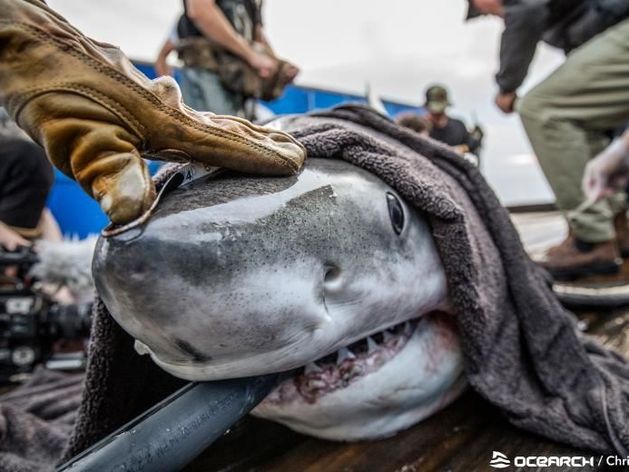Ireland is a globally recognised hotspot for a variety of shark species, such as the basking shark, porbeagle, and tope shark, but great whites are yet to be formally recorded here.
A group of Irish shark scientists will this September host OCEARCH, a US-based great white shark research non-profit, with the goal of documenting the first record of the species in Irish waters.
“The food options for them are ideal,” said Dr Nick Payne of Trinity College Dublin.
Ireland is a globally recognised hotspot for a variety of shark species, such as the basking shark, porbeagle, and tope shark, but great whites are yet to be formally recorded here.
Found throughout the world’s oceans, great whites were historically common throughout the Mediterranean before overfishing caused major declines in their numbers.
Confirmed records of the species have occurred as far north as the Bay of Biscay but reports around Ireland and the UK are confined to anecdotal sightings.
The species hit the headlines as recently as last week, with reports indicating that one had been seen off the Galway coast – although experts now believe the supporting video was seemingly not filmed in Irish waters.
A white shark returns to the ocean. Image credit OCEARCH, Chris Ross.
Dr Payne, Assistant Professor in Trinity College Dublin’s School of Natural Sciences, is leading the Irish expedition, and is optimistic about the team’s chances: “Those of us that study great whites in other parts of the world have had our eyes on Ireland as a likely location that the species may occasionally visit.
“The temperature and food options for them are ideal, so we think it’s just a matter of time before we find one here,” he said.
“It’s exciting to have some of the world’s best great white researchers visiting Ireland to search for these amazing animals, and it’s also a brilliant opportunity to highlight all the other incredible sharks we have in our waters, as well as some of the threats they face.”
The Irish team involves researchers from Trinity, University College Dublin, University College Cork, Munster Technological University, the Irish Whale and Dolphin Group, Marine Institute and Fair Seas.
While searching for great whites, the team will also undertake a range of research on other shark and ray species of conservation concern.
Dr Harley Newton, OCEARCH Chief Scientist and Veterinarian, appreciates the importance of healthy shark populations.
“Sharks are keystone species in marine ecosystems,” she said.
“As top predators in the food web they regulate prey populations and through that shape the diversity, abundance, and distribution of other species. This abundance and diversity is key to the health of marine habitats as well as human livelihoods.
“This expedition is an exciting opportunity to contribute knowledge on Ireland’s shark populations and why we need them.”
Approximately 40 shark species inhabit Irish waters, and unfortunately most of them continue to face a number of contemporary threats with many classified as Endangered, Critically Endangered, or Vulnerable.
While few sharks are intentionally captured for consumption in the State, they are regularly killed incidentally as by-catch in other fisheries, and they also face challenges from habitat destruction and climate change.
Sharks tend to grow slowly and produce small numbers of young each year, which can make them particularly vulnerable.
Dr Payne added: “The Irish Government has a number of obligations for conservation of local shark populations, but effective management requires good understanding of what’s out there and how things are changing.
“While I’m obviously excited about the prospect of seeing a great white this September, I’m also excited about bringing together this great group of shark scientists to work together on learning more about Irish shark populations and on plans to help conserve them for the future.”

